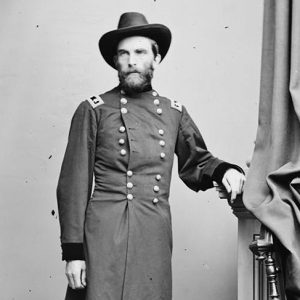calsfoundation@cals.org
Grenville Mellen Dodge (1831–1916)
Grenville Dodge was a Union officer who fought in Arkansas at the Battle of Pea Ridge. Throughout his life, Dodge was an engineer, soldier, politician, and railroad builder.
Grenville Mellen Dodge was born in Danvers, Massachusetts, on April 12, 1831, to Silvanus Dodge and Julia Theresa Phillips Dodge. Dodge was admitted to Norwich University in 1847 and majored in engineering and military tactics, graduating in 1850. He married Ruth Anne Browne on May 29, 1854, and they had three daughters. Dodge and his family moved to Council Bluffs, Iowa, in 1855. Foreshadowing future endeavors in his life, in 1859, Dodge met presidential candidate Abraham Lincoln and they talked about railroads.
In July 1861, Dodge joined the Union army; he was appointed colonel by Iowa’s governor and assigned to Union general Samuel Curtis. At the Battle of Pea Ridge (March 7–8, 1862), Dodge served under Colonel Eugene Carr. At the end of the day on March 6, Dodge suggested to General Curtis that the Bentonville Detour be blocked to delay the advance of Confederate general Earl Van Dorn. At 9:00 p.m., Dodge’s men felled trees across Bentonville Detour. Dodge’s idea bought five critical hours for the Union army.
General Curtis ordered Colonels Carr and Dodge to Elkhorn Tavern. By 11:30 a.m., March 7, Carr and Dodge arrived at the tavern. Dodge responded to a flanking maneuver by Confederate general Sterling Price from the east to the west, toward Elkhorn Tavern. Price made three determined attacks down Huntsville Road on Dodge’s position in Clemon’s Field. Dodge moved calmly on horseback, encouraged his men, and avoided artillery fire. Dodge had three horses shot out from under him, suffered two broken ribs, and had his uniform coat pierced by small-arms fire. Confederate generals Van Dorn and Price had overwhelming numbers and ultimately forced Carr and Dodge back a distance of more than a mile. Darkness abruptly brought a halt to fighting for the day.
The next day, March 8, after a two-hour artillery bombardment, Curtis counterattacked. General Van Dorn, who had sent the army’s ammunition train eight miles distant, to Camp Stephens, decided to retreat. After the battle, Dodge said: “This campaign demonstrated early in the war, what could be accomplished by a small army 300 miles away from any rail or water communication, in a rugged mountainous, sparsely settled country, marching in winter, and virtually subsisting upon the country.” The Battle of Pea Ridge was a decisive Union victory. Dodge was promoted to brigadier general and became a national hero.
After Pea Ridge, Dodge transferred to Mississippi to serve under General Ulysses S. Grant in the ninety-eight-day 1863 Vicksburg Campaign. Dodge assumed command of the XVI Army Corps. He was to protect Grant’s communications and build and rebuild railroads. On his own accord, Dodge organized an espionage network that paid as much as $5,000 a month for information. (In comparison, Dodge’s salary was about $5,000 per year in 1863.) He also organized the First Alabama Infantry, African Descent, at Corinth, Mississippi, on May 21, 1863.
After Vicksburg, Dodge served under General William Tecumseh Sherman in the Atlanta Campaign. In August 1864, he was wounded by a Confederate sharpshooter as he placed his eye to a peephole to observe the field in his front. Two newspapers, the New York Herald and the New York Tribune, erroneously reported him dead. After recovering from his wound, Dodge was appointed commander of the Department of Missouri. Dodge began operations to quell Native American raids in the area.
Despite not campaigning, Dodge was elected to the U.S. Congress in 1867. He served a single term and was a delegate to Republican National Conventions in 1868, 1872, and 1876.
Dodge served as chief engineer of the Union and Pacific Railroad on the following condition: “I will become chief engineer only on condition that I be given absolute control in the field. You are about to build a railroad through country that neither has law nor order and who ever heads the work must be backed up.” Dodge and railroad officials were constantly at odds. The Trans-Continental Railroad was completed on May 10, 1869, as Dodge was present when the golden spike was driven home connecting the two coasts.
Dodge served as an informal advisor to Presidents U. S. Grant, William McKinley, Theodore Roosevelt, and William Howard Taft. Grant tried to appoint him Secretary of War in 1871, but he declined. Dodge was part of the 1872 Crédit Mobilier scandal, one of the greatest political scandals in the latter half of the nineteenth century, having been offered free or discounted stock in the company.
Dodge was involved in several veterans’ organizations. He led the funeral procession of former President U. S. Grant in 1885. Dodge was asked by President William McKinley to chair a commission to look into U.S. Army misconduct in the Spanish-American War in 1898. By 1906, his health had declined. Dodge died of cancer on January 3, 1916, at Council Bluffs and is buried at Walnut Hill Cemetery.
For additional information:
Ambrose, Stephen. Nothing Like It in the World: The Men Who Built the Trans-Continental Railroad, 1863–1869. New York: Simon & Schuster, 2001.
Farnham, Wallace D. “Grenville Dodge and the Union Pacific: A Study of Historical Legends.” Journal of American History 3 (March 1965): 181–191.
Hirshon, Stanley P. Grenville M. Dodge: Soldier, Politician, Railroad Pioneer. Bloomington: Indiana University Press, 1967.
Hofsommer, Don L. “Grenville Mellen Dodge.” The Biographical Dictionary of Iowa. Iowa City: University of Iowa Press, 2009.
Letter, David. “Grenville Dodge.” Iowa Heritage Illustrated 93 (Spring 2014): 51–61.
Morgans, James P. Grenville Mellen Dodge Union Spymaster, Railroad Builder, and Organizer of the Fourth Iowa Volunteer Infantry. Jefferson, NC: McFarland and Company, 2016.
Perkins, J. R. Trails, Rails, and War: Life of G. M. Dodge in the Civil War. Indianapolis: Bobbs-Merrill, 1929.
Shea, William, and Earl J. Hess. Pea Ridge: Civil War Campaign in the West. Chapel Hill: University of North Carolina Press, 1994.
Trask, Richard. “Grenville M. Dodge.” Danvers Archival Center at the Peabody Institute Library. http://www.danverslibrary.org/archive/?page_id=2702 (accessed August 26, 2020).
Warner, Ezra. Generals in Blue: Lives of Union Commanders. Baton Rouge: Louisiana State University Press, 1992.
Kerry King Jones
Fayetteville, Arkansas









Comments
No comments on this entry yet.